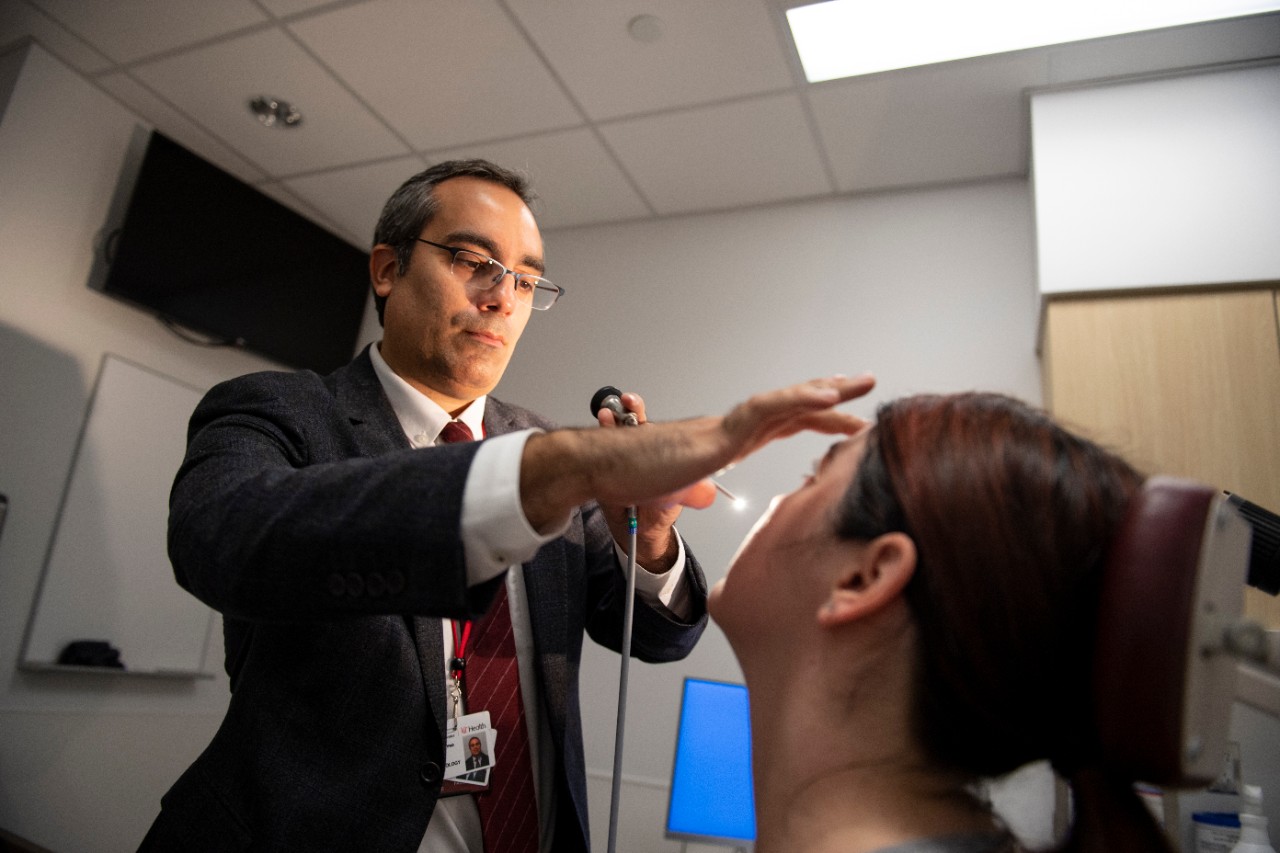
Fall allergies can make life miserable for many
UC ear, nose and throat expert offers a few tips for keeping allergies in check
If you have itchy puffy eyes and a nasal drip that just won’t quit, you might be one of more than 23 million Americans with ragweed allergies. This troublesome weed is making life miserable for many as the seasons change.
“The end of summer and early fall is the peak time for ragweed allergy and for allergy to weeds in general,” explains Ahmad Sedaghat, MD, PhD, an associate professor in the University of Cincinnati College of Medicine and UC Health physician. “The Ohio River Valley is a particularly bad place for allergies as geography and climate have made it an optimal environment for pollen-producing plants such as ragweed so the frequency and severity of allergies are higher in our region.”
Ragweed allergy symptoms include sneezing, runny nose, nasal congestion and itchy eyes, nose and throat, according to the Asthma and Allergy Foundation of America.
“These symptoms and the underlying allergic inflammation can impact quality of life for many by interfering in our ability to work and handle chores while worsening other conditions such as chronic sinusitis or recurrent sinusitis,” says Sedaghat, director of rhinology, allergy and anterior skull base surgery, in the UC Department of Otolaryngology-Head and Neck Surgery.

Ahmad Sedaghat, MD, PhD, shown in the UC Gardner Neuroscience Institute. Photo by Colleen Kelley/UC Creative + Brand.
Sedaghat offers a few tips for easing those symptoms.
- Get a head start on treating allergies in the late summer before weed pollen levels get too high by daily consistent use of an over-the-counter nasal steroid spray. Another option is using an antihistamine tablet which is also available without prescription.
- Consider following daily pollen counts using one of the “pollen trackers” that share the counts for free online. Try to stay indoors on particularly bad days.
- Saltwater rinses or irrigations can be helpful to wash out any pollen that may enter the nose and get trapped in nasal mucus.
There are also other treatments out there to tackle allergies such as immunotherapy or allergy shots.
“Immunotherapy can be in the form of shots in a doctor’s office but sublingual forms exist as well, which can be conveniently administered at home,” says Sedaghat. “For patients whose symptoms remain severe despite all medications, there are even some minimally invasive surgical options that can improve nasal blockage as well as reduce mucus production by isolating and selectively cutting the microscopic nerves that enter the nose and which stimulate mucus production”
In the midst of worries about COVID-19, some might confuse allergy symptoms or indications of influenza with the novel coronavirus.
“Allergy is an inflammatory condition where the body’s immune system reacts against another harmless substance, notably the allergen,” says Sedaghat. “For example, there is no reason why pollen would be harmful but the body’s immune system may react to it in the setting of allergy. In comparison, the flu or COVID-19 are manifestations of the immune system’s fight against harmful viruses.”
“From the standpoint of symptoms, allergies are much more likely to manifest with prominent nasal symptoms, in particular sneezing or itching,” says Sedaghat, who has published a couple of research studies about COVID-19 symptoms starting in the nose.
“Our own studies were the first to show that some COVID-19 patients may have nasal symptoms such as congestion and mucus production, but we also showed that those symptoms tend to be rather mild when occurring during COVID-19,” says Sedaghat. “Those patients with COVID-19 and nasal symptoms also frequently in the setting of other systemic symptoms such cough, fever, shortness of breath, malaise and muscle aches.”
“Allergy patients more frequently experience severe nasal symptoms that are isolated and they often have a prior history of seasonal nasal symptoms,” adds Sedaghat.
For more questions about seasonal allergies or to make an appointment with a physician call 513-475-8400 or visit uchealth.com/otolaryngology.
Impact Lives Here
The University of Cincinnati is leading public urban universities into a new era of innovation and impact. Our faculty, staff and students are saving lives, changing outcomes and bending the future in our city's direction. Next Lives Here.
Stay up on all UC's COVID-19 stories, read more #UCtheGood content, or take a UC virtual visit and begin picturing yourself at an institution that inspires incredible stories.
Related Stories
'Paradigm-shifting' study confirms effectiveness of long-acting HIV treatment
February 26, 2026
The results of a clinical trial involving the University of Cincinnati, recently published in The New England Journal of Medicine, show people failing HIV treatments with oral medications were able to be treated successfully using injections.
How do horses whinny?
February 26, 2026
A horse makes the low-pitched part of its whinny by vibrating its vocal cords — similar to how humans speak and sing — and the high-pitched part by whistling with its voice box, according to a new paper published in the journal Current Biology and featured in Smithsonian magazine.
UC receives grant for AI use in medical education
February 26, 2026
The University of Cincinnati is turning to artificial intelligence to help solve a problem in medical training. The College of Medicine was awarded a grant valued at more than $1 million to use AI in advanced physician training through personalized learning.
